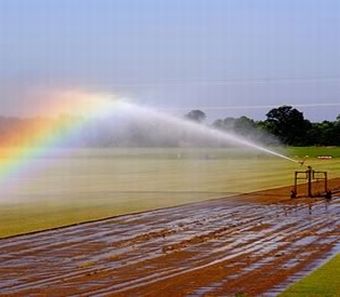
Publisher:
Bonnie King
CONTACT:
Newsroom@Salem-news.com
Advertising:
Adsales@Salem-news.com

~Truth~
~Justice~
~Peace~
TJP
Apr-13-2010 15:37

 TweetFollow @OregonNews
TweetFollow @OregonNews
Older Farmers May Opt out of Water Conservation Systems
Salem-News.com“One of the best ways we can promote water conservation is to encourage younger people to get into farming, so long-term investments will be worth the cost” - Eric Schuck, economics professor at Linfield College
 Courtesy: ocw.usu.edu |
(McMINNVILLE, Ore.) - Irrigation season kicked off April 1, but some Oregon farmers won’t see much of a flow. Although recent storms could mitigate shortages in some areas, drought conditions persist east of the Cascades, and water supplies throughout the state are increasingly contested, with future demand projected to outstrip supply.
In spite of the pressure on water systems, not many farmers will make the move to implement more water-efficient systems, said Eric Schuck, economics professor at Linfield College. “The adoption of less water-intensive systems and crops is quite low, despite the potential benefits.”
“Some farmers may want to switch from a crop like alfalfa to wheat, but lack the infrastructure to support the transition, and drip irrigation systems or low-pressure sprinklers are not compatible with every crop,” he said. “The shift also requires experience and knowledge.”
Another hurdle? Farmers face cost constraints, even with agricultural subsidies. Projected profits from water conservation don’t add up to money in the bank this year.
But the biggest obstacle to adoption of conservation systems is the impending retirement of the agricultural population, Schuck said. “As the number of people entering farming drops, the average age of farmers goes up, and the older they are, the less likely they are to invest in water-conserving technologies.
“It’s common sense,” he said. “Farmers are looking at investments that have a 15-year timeline. Even though less water-intensive systems can make farming easier and promote better yields for some crops, the investment doesn’t pay off for farmers over 60. They know their business better than we do. If they don’t pursue what seems like a profitable approach, there’s usually a reason.
“Unfortunately,” Schuck said, “the low rate of adoption has significant implications for statewide water supplies. We need to find ways to facilitate a move toward conservation.” He advocates a two-pronged approach.
“One of the best ways we can promote water conservation is to encourage younger people to get into farming, so long-term investments will be worth the cost,” he said. “We’re seeing a generational shift, with many younger farmers taking advantage of federal cost-sharing programs to invest in water-efficient technologies.”
Many of Schuck’s college students come from rural areas. “A lot of second- or third-generation farm kids are in college because they want to understand what’s happening to their families and towns, but they are also looking for new avenues,” he said. “They want to gain a skill set that will allow them to survive a changing marketplace, and ideally, some of them will take those skills back to the farm.”
Schuck also recommends providing assistance to current farmers to help them retool. “In addition to agricultural subsidies, we need to provide transitional support and help farmers find alternative industries,” he said.
That’s easier said than done. “There are few non-agricultural jobs in many rural areas, and economies don’t have much depth in terms of employment. We need to provide educational opportunities so people can participate in other areas of the economy. Many residents of rural areas are fixed in place, so we have to bring training to them.
“We romanticize agriculture,” Schuck said, “but it’s a very hard industry. It’s hard to make money, and it’s a business that behaves unlike any other. Farmers face a high level of uncertainty. There’s a historic dependence on the natural environment, with all its uncertainties, and farmers only get a handful of product decisions each year. The processing of farm products is dominated by a small number of huge firms that set the price, and global markets can wreck havoc with local markets. The price of pears is not always set by the local supply, but by bumper crops halfway around the globe.”
In spite of the difficulties, and in spite of drought, life on a farm has an allure to many. Schuck and others hope young people replace aging irrigation systems, and take the place of their aging elders as they retire.
Drought Monitor
drought.unl.edu/dm/DM_state.htm?OR,W
Oregon Water Resources Department
oregon.gov/OWRD/WR/drought.shtml
Articles for April 12, 2010 | Articles for April 13, 2010 | Articles for April 14, 2010



googlec507860f6901db00.html
Quick Links
DINING
Willamette UniversityGoudy Commons Cafe
Dine on the Queen
Willamette Queen Sternwheeler
MUST SEE SALEM
Oregon Capitol ToursCapitol History Gateway
Willamette River Ride
Willamette Queen Sternwheeler
Historic Home Tours:
Deepwood Museum
The Bush House
Gaiety Hollow Garden
AUCTIONS - APPRAISALS
Auction Masters & AppraisalsCONSTRUCTION SERVICES
Roofing and ContractingSheridan, Ore.
ONLINE SHOPPING
Special Occasion DressesAdvertise with Salem-News
Contact:AdSales@Salem-News.com

Terms of Service | Privacy Policy
All comments and messages are approved by people and self promotional links or unacceptable comments are denied.
[Return to Top]
©2026 Salem-News.com. All opinions expressed in this article are those of the author and do not necessarily reflect those of Salem-News.com.